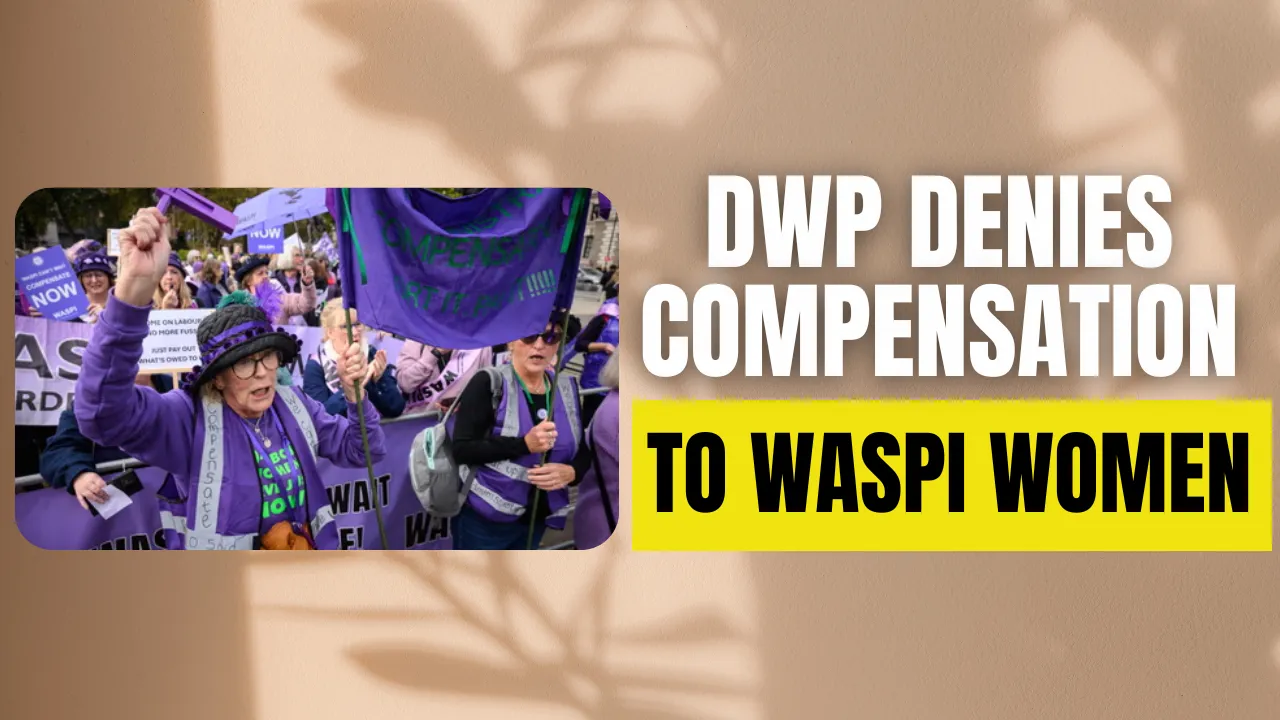WASPI women: The UK Government’s decision to deny compensation to WASPI women (Women Against State Pension Inequality) has sparked widespread outrage and reignited debates about fairness and accountability. These women, born in the 1950s, have faced significant financial and emotional hardship due to the government’s failure to provide adequate notice about changes to the State Pension Age (SPA). Despite a Parliamentary Ombudsman’s recommendation to compensate affected women between £1,000 and £2,950 each, the government rejected the proposal, citing fiscal concerns.
This article explores the timeline of SPA changes, the government’s rationale for rejecting compensation, the ongoing impact on WASPI women, and the broader implications of this contentious decision.
Key Milestones in SPA Changes
Changes to the State Pension Age were introduced through key legislation designed to equalize retirement ages for men and women and ensure the sustainability of the pension system. Below is an overview of the timeline and key changes:
| Year | Legislation | Key Changes |
| 1995 | Pensions Act | Raised women’s SPA from 60 to 65 by 2020. |
| 2011 | Pensions Act | Accelerated SPA increases, reaching 65 by 2018 and 66 by 2020. |
| 2026–2028 | Planned Changes | SPA to rise to 67 for both genders. |
The 2011 Pensions Act particularly affected women born in the 1950s. Many were given limited notice of these changes, leaving them unprepared for delayed retirement and the resulting financial consequences.
Why Were SPA Changes Introduced?
The reforms to the State Pension Age were driven by several factors:
- Promoting Gender Equality: The changes aimed to equalize retirement ages for men and women, reflecting modern societal standards.
- Addressing Increased Life Expectancy: With people living longer, the government sought to ensure the sustainability of the pension system.
- Managing Public Finances: Raising the SPA helped reduce state pension costs, addressing budgetary pressures caused by an aging population.
While these goals were well-intentioned, the abrupt implementation of the reforms disproportionately impacted women born in the 1950s, many of whom had little time to adapt to the changes.
Findings from the Parliamentary Ombudsman
The Parliamentary Ombudsman conducted an investigation into the handling of SPA changes, concluding that the Department for Work and Pensions (DWP) had failed to provide adequate notice to affected women.
Key Failures Identified
- Delayed Notifications: Some women received notification letters up to 28 months later than they should have, leaving them unprepared for the delay in their pension payments.
- Lack of Proactive Communication: The DWP failed to implement sufficient measures to ensure that all affected individuals were fully informed about the changes.
Ombudsman’s Recommendations
To address the financial and emotional hardship caused by these failures, the Ombudsman recommended compensation ranging from £1,000 to £2,950 per person, depending on the severity of the impact. This was intended to provide some redress for the distress caused by the delayed communication.
Government’s Rejection of Compensation
Despite the Ombudsman’s findings, the UK Government has refused to provide compensation to WASPI women.
Reasons for the Rejection
- Public Awareness Campaigns: The government argued that public campaigns and media coverage were sufficient to inform individuals about the SPA changes.
- High Cost of Compensation: Compensation costs were estimated at £10.5 billion, which the government claimed would place an unsustainable burden on taxpayers.
- Lack of Direct Evidence: Work and Pensions Secretary Liz Kendall stated that there was no clear evidence linking the delayed communication to significant financial harm.
Prime Minister Sir Keir Starmer supported this stance, citing fiscal responsibility as a key consideration, while also expressing sympathy for the affected women.
Reactions to the Decision
The government’s decision has been met with widespread criticism from advocacy groups, pension experts, and the public.
WASPI Campaign’s Response
The WASPI campaign group has condemned the decision as an insult to the millions of women affected. Angela Madden, Chair of WASPI, accused the government of undermining the authority of the Parliamentary Ombudsman and eroding trust in independent oversight bodies.
Expert Opinions
Steve Webb, a former Pensions Minister, described the rejection as a “worrying precedent.” He warned that this decision could set a dangerous example, allowing future governments to dismiss independent recommendations, thus weakening accountability mechanisms.
Financial and Emotional Impact on WASPI Women
The abrupt changes to the SPA have left many WASPI women in difficult circumstances, exacerbating financial and emotional challenges.
Financial Hardship
- Many women were forced to deplete their savings or rely on alternative income sources, such as part-time work, to bridge the gap caused by delayed pension payments.
- Those with limited access to additional income options struggled to maintain financial stability.
Career Disruption
- Women who had already left the workforce based on the previous SPA found it difficult to re-enter due to age-related barriers and skill gaps.
- The delay in pensions disrupted their retirement plans, forcing some to take up employment despite health or caregiving responsibilities.
Mental Health Strain
- The uncertainty and perceived injustice caused stress, anxiety, and depression among affected women.
- Many have expressed feelings of betrayal and anger toward the government for failing to acknowledge their struggles.
Broader Implications
The decision not to compensate WASPI women has significant implications for public trust, government accountability, and the future of pension reforms.
Erosion of Trust in Oversight Bodies
By rejecting the Ombudsman’s recommendations, the government risks undermining the credibility of independent oversight institutions. This could weaken public confidence in bodies designed to hold the government accountable for its actions.
Balancing Fiscal Responsibility with Fairness
While the government cites financial concerns as the reason for rejecting compensation, critics argue that addressing historical grievances is essential to maintaining fairness and equality in public policy.
The Path Forward
Although the government has refused compensation, advocacy groups and legal experts continue to push for justice for WASPI women.
Possible Outcomes
| Scenario | Implications |
| Reconsideration of Compensation | Partial compensation could restore trust while managing fiscal concerns. |
| Judicial Review | Legal challenges could force the government to revisit its decision. |
| Policy Improvements | Future pension reforms could incorporate better communication and planning. |
The WASPI campaign has vowed to continue advocating for fair treatment, ensuring that the voices of affected women remain heard in public discourse.
FAQs
Who are the WASPI women?
WASPI women are women born in the 1950s who were impacted by changes to the State Pension Age, particularly due to inadequate notice about these changes.
What did the Ombudsman recommend?
The Ombudsman recommended compensation of £1,000 to £2,950 per person to address the financial and emotional distress caused by delayed notifications.
Why did the government reject compensation?
The government cited the high cost of compensation (£10.5 billion) and argued that public awareness campaigns were sufficient to inform people about the SPA changes.
What are the broader implications of this decision?
The rejection undermines trust in independent oversight bodies and raises concerns about the government’s accountability and fairness.
What is the estimated cost of compensation?
The estimated cost of compensating WASPI women is approximately £10.5 billion.
Final Thoughts
The denial of compensation for WASPI women pension underpayments has left millions of women feeling betrayed and overlooked. While the government’s concerns about fiscal responsibility are valid, failing to address these historical grievances risks deepening public dissatisfaction and eroding trust in government institutions.
As the WASPI campaign continues its fight for justice, this issue remains a powerful reminder of the importance of transparency and fairness in public policy. Whether the government revisits its decision or advocacy groups pursue legal action, the debate is far from over.
If you’ve been affected by these changes or want to share your perspective, join the conversation in the comments below. Let’s work together to ensure a fair outcome for all.
Read Also






